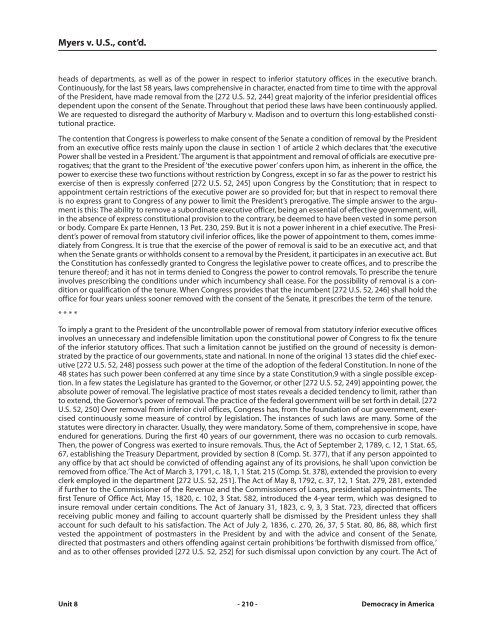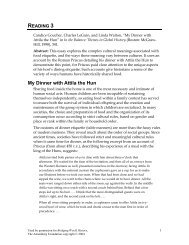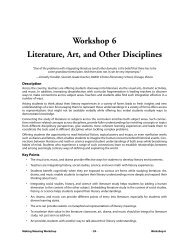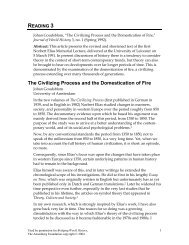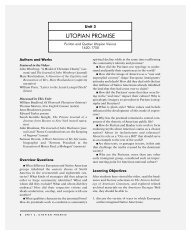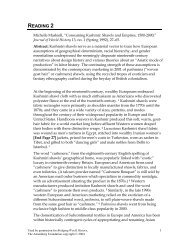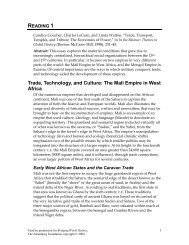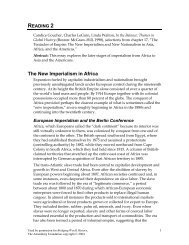Download Unit 8 Readings, Bureaucracy: A Controversial Necessity
Download Unit 8 Readings, Bureaucracy: A Controversial Necessity
Download Unit 8 Readings, Bureaucracy: A Controversial Necessity
Create successful ePaper yourself
Turn your PDF publications into a flip-book with our unique Google optimized e-Paper software.
Myers v. U.S., cont’d.<br />
heads of departments, as well as of the power in respect to inferior statutory offices in the executive branch.<br />
Continuously, for the last 58 years, laws comprehensive in character, enacted from time to time with the approval<br />
of the President, have made removal from the [272 U.S. 52, 244] great majority of the inferior presidential offices<br />
dependent upon the consent of the Senate. Throughout that period these laws have been continuously applied.<br />
We are requested to disregard the authority of Marbury v. Madison and to overturn this long-established constitutional<br />
practice.<br />
The contention that Congress is powerless to make consent of the Senate a condition of removal by the President<br />
from an executive office rests mainly upon the clause in section 1 of article 2 which declares that ‘the executive<br />
Power shall be vested in a President.’The argument is that appointment and removal of officials are executive prerogatives;<br />
that the grant to the President of ‘the executive power’ confers upon him, as inherent in the office, the<br />
power to exercise these two functions without restriction by Congress, except in so far as the power to restrict his<br />
exercise of then is expressly conferred [272 U.S. 52, 245] upon Congress by the Constitution; that in respect to<br />
appointment certain restrictions of the executive power are so provided for; but that in respect to removal there<br />
is no express grant to Congress of any power to limit the President’s prerogative. The simple answer to the argument<br />
is this: The ability to remove a subordinate executive officer, being an essential of effective government, will,<br />
in the absence of express constitutional provision to the contrary, be deemed to have been vested in some person<br />
or body. Compare Ex parte Hennen, 13 Pet. 230, 259. But it is not a power inherent in a chief executive. The President’s<br />
power of removal from statutory civil inferior offices, like the power of appointment to them, comes immediately<br />
from Congress. It is true that the exercise of the power of removal is said to be an executive act, and that<br />
when the Senate grants or withholds consent to a removal by the President, it participates in an executive act. But<br />
the Constitution has confessedly granted to Congress the legislative power to create offices, and to prescribe the<br />
tenure thereof; and it has not in terms denied to Congress the power to control removals. To prescribe the tenure<br />
involves prescribing the conditions under which incumbency shall cease. For the possibility of removal is a condition<br />
or qualification of the tenure. When Congress provides that the incumbent [272 U.S. 52, 246] shall hold the<br />
office for four years unless sooner removed with the consent of the Senate, it prescribes the term of the tenure.<br />
* * * *<br />
To imply a grant to the President of the uncontrollable power of removal from statutory inferior executive offices<br />
involves an unnecessary and indefensible limitation upon the constitutional power of Congress to fix the tenure<br />
of the inferior statutory offices. That such a limitation cannot be justified on the ground of necessity is demonstrated<br />
by the practice of our governments, state and national. In none of the original 13 states did the chief executive<br />
[272 U.S. 52, 248] possess such power at the time of the adoption of the federal Constitution. In none of the<br />
48 states has such power been conferred at any time since by a state Constitution,9 with a single possible exception.<br />
In a few states the Legislature has granted to the Governor, or other [272 U.S. 52, 249] appointing power, the<br />
absolute power of removal. The legislative practice of most states reveals a decided tendency to limit, rather than<br />
to extend, the Governor’s power of removal. The practice of the federal government will be set forth in detail. [272<br />
U.S. 52, 250] Over removal from inferior civil offices, Congress has, from the foundation of our government, exercised<br />
continuously some measure of control by legislation. The instances of such laws are many. Some of the<br />
statutes were directory in character. Usually, they were mandatory. Some of them, comprehensive in scope, have<br />
endured for generations. During the first 40 years of our government, there was no occasion to curb removals.<br />
Then, the power of Congress was exerted to insure removals. Thus, the Act of September 2, 1789, c. 12, 1 Stat. 65,<br />
67, establishing the Treasury Department, provided by section 8 (Comp. St. 377), that if any person appointed to<br />
any office by that act should be convicted of offending against any of its provisions, he shall ‘upon conviction be<br />
removed from office.’The Act of March 3, 1791, c. 18, 1, 1 Stat. 215 (Comp. St. 378), extended the provision to every<br />
clerk employed in the department [272 U.S. 52, 251]. The Act of May 8, 1792, c. 37, 12, 1 Stat. 279, 281, extended<br />
if further to the Commissioner of the Revenue and the Commissioners of Loans, presidential appointments. The<br />
first Tenure of Office Act, May 15, 1820, c. 102, 3 Stat. 582, introduced the 4-year term, which was designed to<br />
insure removal under certain conditions. The Act of January 31, 1823, c. 9, 3, 3 Stat. 723, directed that officers<br />
receiving public money and failing to account quarterly shall be dismissed by the President unless they shall<br />
account for such default to his satisfaction. The Act of July 2, 1836, c. 270, 26, 37, 5 Stat. 80, 86, 88, which first<br />
vested the appointment of postmasters in the President by and with the advice and consent of the Senate,<br />
directed that postmasters and others offending against certain prohibitions ‘be forthwith dismissed from office,’<br />
and as to other offenses provided [272 U.S. 52, 252] for such dismissal upon conviction by any court. The Act of<br />
<strong>Unit</strong> 8 - 210 - Democracy in America


